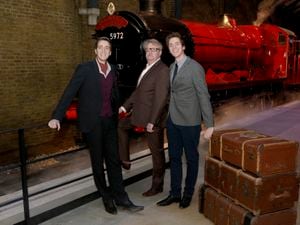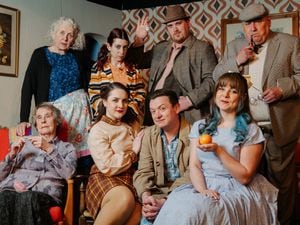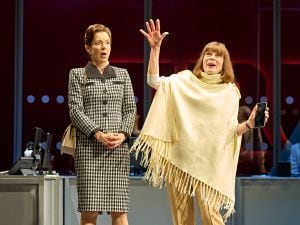Big Interview: Versatile actor Mark Williams cannot wait to play festive part
He’s the sort of guy who everyone recognises. Yet he’s also the sort of guy who some might find it hard to put a name to.

The actor Mark Williams is better known for his work in BBC’s The Fast Show, or such film roles as Horace in the 1996 adaptation of 101 Dalmations or, more presciently, Arthur Weasley in seven of the Harry Potter films.
Not that those define a remarkably varied career. He’s made recurring appearances in Doctor Who while his portrayal of the title character in the long-running BBC series, Father Brown, is a role of which he’s particularly proud.
He’s a thoughtful man and a funny man. His acting is detailed and precise. He inhibits a character in the great tradition of British character actors. He remains puzzled that people view him as a comedian because of his exceptional work alongside Paul Whitehouse, Charlie Higson, Caroline Aherne and others in The Fast Show. From his perspective, he’s simply creating believable characters – the laughter is a bonus.
That work, however, in addition to his roles in Harry Potter, 101 Dalmations, Doctor Who and Father Brown mean he’s in constant demand. He’s just visited Telford, for instance, where he was part of a vast Comic Con. It was busy,” he says, gleefully.
“I was meeting the folks. It was busy. Those events are great fun. People are very enthusiastic and it’s very good for them. They can come and let go and dress up. A lot of the people who go to them might normally not get out much, they might find it difficult to express themselves. But they can come to those and dress up and dance and do what they want. They’re great.”
Williams hails from the Midlands, being born in Bromsgrove and educated in the town before moving onto Brasenose College, Oxford, where he joined the Oxford University Dramatic Society. He made a career with the Royal Shakespeare Company and the Royal National Theatre before migrating to such TV shows as Alexei Sayle’s Stuff and The Fast Show. His popularity led many to mistakenly view him as a comic, though he’s avowedly a character actor.
“I went to the RSC and the National as well as Birmingham Rep. Theatre was something I did at school. It was something I realised I could do. I clearly remember the first play I was in and I knew how to do it. I was no good at maths or sport or painting but I thought I could act, it felt like mine. That was liberating.
“After that, I couldn’t get enough of it. I did everything I could at school and at university then I made the decision to try and become an actor. That was a leap of faith. I spent years out of work, a lot of people do. I was never cast for my sexual attraction – that was never going to happen. I am a character actor, that’s what I do. I have had a blessed life and a blessed career. There were times when I didn’t know why I was sticking it but things came good in the end.”
He’s never sought to play particular roles, be they straight or funny. He’s been picked by casting agents and directors, rather than made choices that shaped his career.
“Everything I’ve ever done has been because I’ve been cast, i.e. I’ve been picked. I’ve never pushed in any direction. I’ve never influenced the sort of jobs I’ve got. So those jobs working with Alexei and Harry Enfield and The Fast Show was because they wanted somebody to do a specific job on each occasion.
“I know people laugh at the characters but to me, it all feels like Hamlet. I’m playing them straight. The audience are laughing but I’m playing it straight, weird as it may seem.
“I’ve always tried to be true to humanity and how complex people are. One of the things we do as human beings is we are very good at recognising what people are like. That’s what makes people laugh. Most laughter is about recognition. We see ourselves or someone else in a character. It’s not about empathy. Sometimes it’s better not to be too empathetic, particularly if you are playing a baddy – it’s a good idea not to have responsibility at that point.” Williams spent years on the road before moving to London for work and then continuing his journey to the south coast, where he now lives.
He’ll be back in the Midlands soon, however, when he features in Carols By Candlelight at Birmingham’s Symphony Hall on December 18 and 24. The concert will feature readings by Williams as well as well known classical works from Cullen, Willcocks, Pearsall, Handel and Bach. The audience will be invited to sing along to Good King Wenceslas, Hark! The Herald Angels Sing, O Little Town Of Bethlehem, O Come All Ye Faithful, Once In Royal David’s City and more. Williams can’t wait to get festive.
“The link with music and Christmas is so strong. We think about food but actually the triggers for Christmas are not tastes, it’s music. When you hear a carol you are right there.
“It’s very important for us to hear live music especially when we have such a wonderful orchestra and the choir and the young singers from Winchester. I can hear them soaring in the background. It’s marvellous. There’ll be candlelight there and there’s a real sense of occasion. This year we need to connect and jolly each other up. We need optimism in the face of winter and Covid. We need to show Covid who is boss. Symphony Hall is such a beautiful space and that square outside is great.”
Williams is a fan of classical music, though first and foremost he’s a longstanding fan of carols. “If we are honest, most of us would accept we know more carols than anything else. If you start the first line, most people would be able to do 10 or 20 carols. Because we only hear them once a year, it’s great when they come back. I do love listening to classical music and orchestral music.” I listen to Radio 3 in the car. Selfishly for me, working with an orchestra and a choir is fantastic. I’m a big fan of standing around by the double basses, I don’t know why. I guess I like being near the engine room. “I did a similar thing for the CBSO about six years ago. This is much more of a dramatic occasion with candlelight and costume and the choir. It’ll be very exciting to be on stage and I hope people enjoy it.”
The role for which he’s most widely recognised is Arthur Weasley, a characterisation that is memorably different from the person portrayed in J K Rowling’s books.
His casting wasn’t by accident. He’d previously featured in a string of successful films and had developed both the reputation and skills that made him the perfect fit.
“Harry Potter wasn’t out of the blue. 101 Dalmations and The Borrowers and Shakespeare In Love all came before Harry Potter. So that film didn’t mark a new direction for me. The reason they cast me was because of the experience I’d got on those projects and because of the experience I’d also got of working with children.
“There are problems to be solved in big films, especially when you are doing stuff that’s very technical. They don’t want to worry about the character actors when they have young children to deal with. They want problem-solvers not problem-makers.”
Even so, Williams was able to imbue his character with a unique personality that made him stand out.
“My Arthur is different to Jo Rowling’s Arthur. Mine is more outgoing and less henpecked. That’s what I thought about when I read the books. There’s an enthusiasm in his interests and his love for his family.”
Williams is comfortable with his position in life.
He’s widely respected, his talent speaks for itself and he has an impressive CV that shows a broad range of skills. He’s highly regarded by his peers and able to do interesting work.
He’s also happy to fly under the radar, to an extent, avoiding the hassles that come with serious fame and the intrusion that brings.
His career has very much found a sweet spot, where he has choices and opportunities but where the cost of those is not excessively high.
He’s glad to have survived the pandemic and be back at work. “The great thing about the first lockdown was that all actors experienced the same. There’s usually a thing with actors where the phone's not going and everyone’s talking about other people who’ve got work. That didn’t happen because we were all in the same situation. I didn’t do anything remarkable, like learn Chinese or play the lute.”
There’s plenty to look forward to, with a new series of Father Brown from January 3.
“It’s the ninth series and our 100th episode. That’s more than Columbo.”
We wrap it up. He’s covered his career and made jokes about the wild inaccuracies on his Wikipedia page. “A lot of it's wrong. I keep changing it but then people change it back.” He’ll be glad to be back in Brum and he’s been happy speaking about it.
“That was fun. Thank you for not asking me what my ‘favourite everything’ is. It makes a welcome change. You have no idea how glad I am.”





